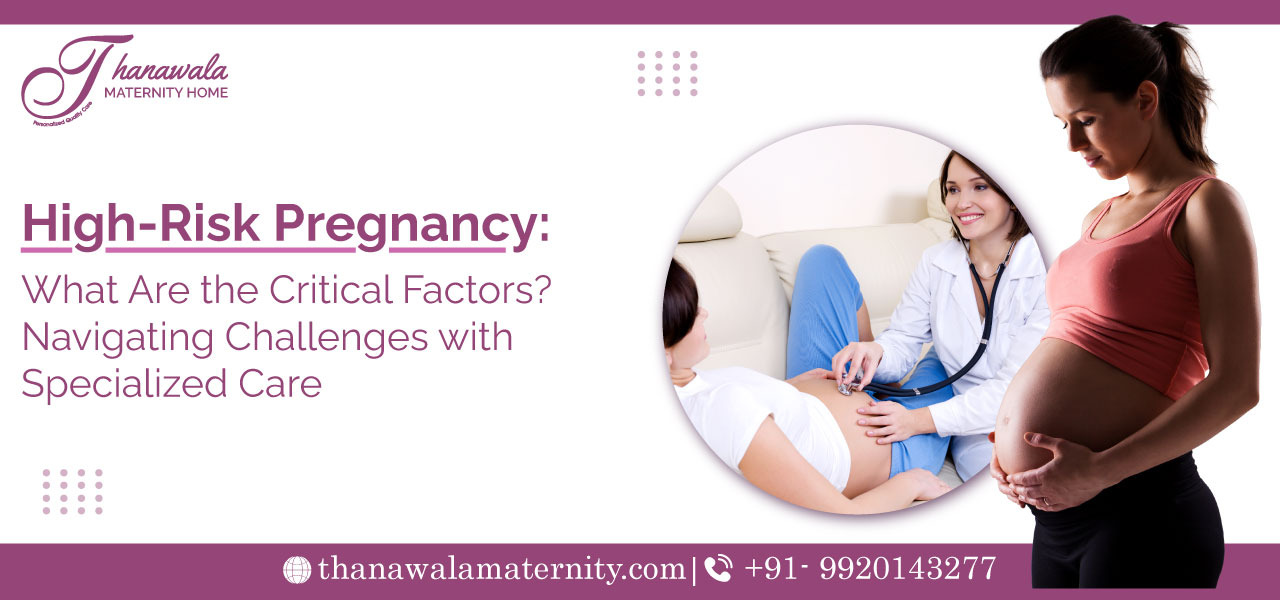Bringing a new life into the world is an exciting journey, but for some expectant mothers, the path can be more complex. A high-risk pregnancy introduces additional challenges that necessitate specialized care. This guide will delve into the definition of a high-risk pregnancy, the critical factors contributing to its classification, and the importance of seeking specialized care from reputable institutions like Thanawala Maternity Home, a leading high-risk pregnancy hospital in Navi Mumbai.
What Is A High-Risk Pregnancy?
A high-risk pregnancy involves increased potential for complications that could affect the health of the mother, the baby, or both. Understanding the factors contributing to this classification is crucial for ensuring optimal care and a successful outcome.
Risk Factors for High-Risk Pregnancy
- Multiple Pregnancies: Expecting twins, triplets, or more increases the complexity and potential risks during pregnancy.
- Previous Medical Conditions: Pre-existing health issues such as hypertension, diabetes, or heart disease may elevate the risk.
- Age: Both very young (under 17) and advanced maternal age (over 35) are considered high-risk.
- Co-occurring Diseases: Conditions like HIV, autoimmune disorders, or cancer may complicate pregnancy.
- Placenta Previa: When the placenta covers the cervix, it can lead to bleeding and pose a risk during delivery.
- Issues Related to Pregnancy: Complications like preeclampsia, premature birth, or inadequate fetal growth increase risk.
- Gestational Diabetes: Elevated blood sugar levels during pregnancy can impact both mother and baby.
- Hematologic Disorders: Conditions affecting blood clotting or anemia may contribute to complications.
- Depression: Mental health plays a crucial role, and pre-existing or pregnancy-induced depression can pose risks.
- Obesity: Excess weight increases the likelihood of gestational diabetes, hypertension, and other complications.
Signs And Symptoms Of A High-Risk Pregnancy
Recognizing signs and symptoms is vital for early intervention. These may include persistent abdominal pain, severe headaches, vision problems, reduced fetal movement, or unusual swelling. Understanding these indicators allows expectant mothers to seek prompt medical attention.
Diagnosing A High-Risk Pregnancy
Thorough prenatal care and screening help identify potential risks early in pregnancy. Advanced maternal age, medical history, and diagnostic tests contribute to an accurate diagnosis. Regular visits to a high-risk pregnancy doctor in Navi Mumbai, such as those at Thanawala Maternity Home, ensure vigilant monitoring.
Monitoring A High-Risk Pregnancy
Continuous monitoring is essential for managing high-risk pregnancies. It includes more frequent prenatal visits, specialized ultrasounds, and additional diagnostic tests. The multidisciplinary team at Thanawala Maternity Home, recognized as a high-risk pregnancy hospital, provides comprehensive monitoring to address specific needs.
When To See A Doctor?
Expectant mothers should promptly seek medical attention if they experience any concerning symptoms or fall into high-risk categories. Early intervention significantly improves outcomes, and consulting with specialists at Thanawala Maternity Home ensures access to expert guidance and care tailored to high-risk pregnancies.
In conclusion, navigating a high-risk pregnancy demands a proactive approach and specialized care. Thanawala Maternity Home stands as a trusted partner for expectant mothers, offering the expertise of high-risk pregnancy doctors in Navi Mumbai and a state-of-the-art facility equipped to manage the complexities associated with high-risk pregnancies. Understanding the critical factors, early detection of risks, and receiving specialized care are pivotal steps toward ensuring a healthy pregnancy journey.
Multiple Pregnancy loss Treatment







